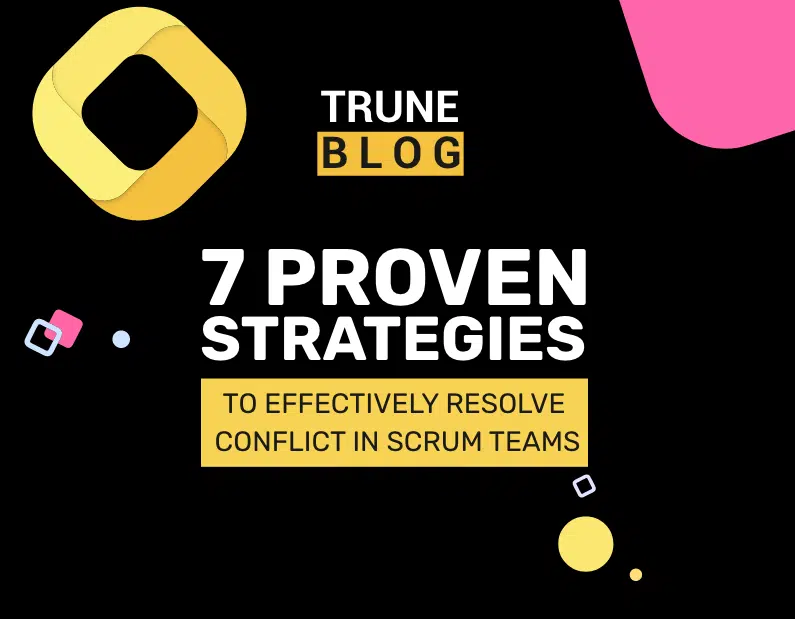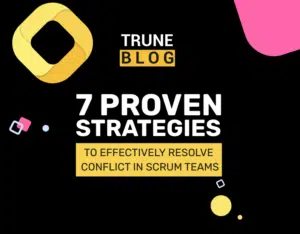„7 Proven Strategies to Effectively Resolve Conflict in Scrum Teams“
Conflicts within your Scrum Master team can hinder progress and productivity. Any Scrum Master must be able to resolve conflicts. A crucial skill you definitely want to add to your toolbox.
It is best to address team conflicts as soon as they occur. Neglecting to address conflicts can cause bigger problems, which can have a negative impact on team dynamics and productivity. To prevent conflicts from becoming more complicated and escalating, it is important to deal with them early.
Scrum Masters should encourage their team members to bring up any issues or concerns as soon as possible. This will allow you to quickly address the problem and prevent it affecting your team’s ability for effective work.
Also, it’s important to provide a supportive and safe environment for team members so they feel comfortable talking about their conflicts. It means listening and being open to feedback from your team. This means that you avoid blaming others and instead focus on solutions that work for everyone.
It’s also important to prevent conflicts from arising. It can include team-building activities, open communication channels and regular check-ins with team members in order to ensure everyone is working well together.
This article will cover the 7 best ways to resolve team conflicts.
Facilitate open communication. Open communication is the key to solving any team conflict. Scrum Masters must create an environment that is safe and supportive so team members feel free to express themselves and their opinions. Active listening encourages listening to understand and not just responding. This will make everyone feel heard and allow the team to work together towards a solution.
Identify problems: It is important to identify the problem before you can solve it. Scrum Masters can help your team identify the problem by asking open-ended question and encouraging discussion. Encourage your team to be focused on the problem and not the person. This reduces personal attacks and promotes collaboration in problem-solving.
Finding common ground: After the problem is identified, it’s time to find common ground. Encourage team members to work together towards common goals and values. This builds trust and understanding among team members. If team members share the same values and goals, they will be more inclined to work together to reach a solution that is mutually beneficial for all.
Brainstorming solutions: Once you have found common ground, it is time to start brainstorming solutions. Encourage team members to brainstorm as many ideas and as many solutions as they can, without judgement. This creates a collaborative and safe environment that allows everyone to voice their opinions. After all ideas have been submitted, you can evaluate them objectively to find the best solution for everyone.
Implement the solution: After the best solution is chosen, it’s now time to implement it. The Scrum Master is responsible for ensuring that everyone understands their roles and responsibilities. You can monitor the progress and make adjustments as necessary. This ensures that the solution is implemented effectively and everyone is on the same page.
Reflect on the experience: After the conflict is resolved, take some time to reflect on the event. Encourage team members to share their feelings and thoughts about the experience. Talk about what went well and what needs to be improved. This reflection can help you and your team learn and grow. This creates a culture that encourages continuous improvement and where everyone is committed to creating a productive work environment. A Retrospective is just perfect to reflect together.
Create a positive culture in your team:This will help prevent future conflicts. Encourage respect, empathy and collaboration. Learn from your mistakes and celebrate successes. This creates a supportive and positive environment that makes everyone feel valued and respected. You can avoid conflicts and create a positive culture within your team to help you build a productive, strong team.
While conflicts can be difficult for your team, they can also provide opportunities for learning and growth. Effective conflict resolution skills are essential for Scrum Masters. You can resolve team conflicts by encouraging open communication, finding common ground and brainstorming solutions. Then implement the chosen solution and reflect on the experience. Finally, by creating a positive culture in your team you can avoid conflicts in the future







